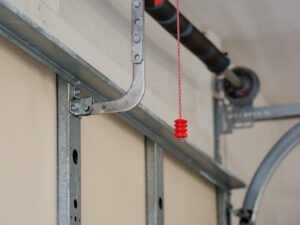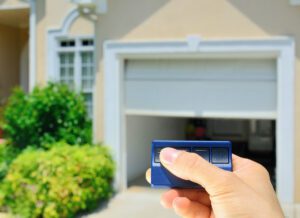
Garage doors are essential components of home security and convenience. However, they can also be sources of frustration when they malfunction. Understanding garage door repairs is crucial for homeowners to ensure their doors function properly and safely. With years of experience, Overhead Door Company of Huntsville/North Alabama™ addresses the most common questions regarding garage door repairs. For more detailed information about each question, follow any links highlighted in red.
Disclaimer: The information contained herein is not meant to be comprehensive and is for informational purposes only. You should not undertake to perform anything described herein without adequate training and/or supervision. Overhead Door Company of Huntsville/North Alabama™ disclaims any responsibility for any injury, damage, or loss as a result of reliance upon the information found on this site/blog.
1. Why did my garage door spring break? Can I repair it myself?
Garage door springs break due to wear and tear, lack of regular maintenance, rust or corrosion, improper installation, extreme temperature fluctuations, or low-quality springs. Springs are crucial components that counterbalance the door’s weight, and when they break, the door can become heavy or completely inoperable.
To learn more about Can I open my garage door with a broken a spring?
Regular inspection, lubrication, and spring replacement when necessary can help prevent sudden failures. Do not manually attempt to operate or open a garage door with broken springs, and do not attempt to repair your garage doors yourself. Contact us for a free estimate for replacing, or adjusting your garage door springs.
2. Why did my garage door opener stop working?
There are several reasons why a garage door opener may stop working. It could be due to power supply issues, malfunctioning remote controls or wall switches, sensor misalignment or blockage, worn-out motor gears or components, or wear and tear over time.
It’s essential to systematically troubleshoot each potential cause to identify and rectify the problem affecting the opener’s functionality. Do not use a garage door opener if you suspect it has issues. Operating a garage door with a broken opener could be dangerous, cause the operator to overheat, and cause the opener to never work again.
To learn more about Diagnosing and Resolving Common Garage Door Opener Motor Issues.
If the garage door doesn’t open, the garage door opener’s motor may have burned out and stopped operating. Contact us for your garage door opener repairs.
3. What happens if I am stuck inside my garage?
Stuck in your garage can be a frustrating experience, especially if the door refuses to open. In such situations, locate the emergency release cord typically hanging from the opener motor. Pulling this cord disengages the door from the opener, allowing you to open or close it manually.
Suppose the door remains difficult to move even after using the emergency release. In that case, it may indicate underlying issues, such as a misaligned track or a broken spring requiring professional attention. Do not attempt to open a garage door manually if you suspect a broken spring or obstacles preventing it from opening manually. For more on understanding the red garage door emergency release.

4. What to do if my rollers are loud?
Loud rollers are often a sign of insufficient lubrication or worn-out rollers. Applying a suitable garage door lubricant to the rollers, hinges, and tracks can significantly reduce noise and improve smooth operation. However, the noise persists even after lubrication. In that case, it may indicate more severe issues, such as worn bearings or damaged components, that should be inspected and replaced by a professional technician. Learn more about garage door roller alignment.
5. If Only One Section is Damaged, Do I Need to Replace the Entire Garage Door?
Damaged garage door panels detract from your home’s curb appeal and can affect the door’s structural integrity and insulation properties.
If you notice dents, cracks, or other damage to your garage door panels, it’s advisable to contact a professional garage door repair service. They can assess the extent of the damage and recommend either panel repairs or replacements to restore the door’s functionality and appearance.
If only one section of your garage door is damaged, you typically don’t need to replace the entire door. Garage doors are often designed in sections, allowing individual panels to be replaced independently. This can save you time and money compared to replacing the entire door.
Discover more about why garage doors bend.
6. What should I do if my garage door tracks need to be aligned?
Misaligned garage door tracks can cause the door to operate unevenly or get stuck during opening or closing. Attempting to realign tracks yourself can be dangerous and may further damage the door or its components.
It’s best to leave track realignment to experienced technicians who have the knowledge and tools to adjust the tracks correctly and ensure smooth and safe door operation. Learn more about garage door track issues.
7. What should I do if my garage door sensors don’t work?
Faulty garage door sensors can prevent the door from closing properly or cause it to reverse unexpectedly during operation. Begin by checking if the sensors are aligned correctly and free from dirt or obstructions. If needed, clean the sensors with a soft cloth.
If the problem persists, it’s recommended to have a professional technician inspect the sensors, adjust their alignment, or replace them if necessary to restore proper functionality and safety.
8. How do lubrication issues impact my garage door, and how should I address them?
Proper lubrication is essential for your garage door’s smooth and efficient operation. Without adequate lubrication, the moving parts, such as hinges, rollers, and tracks, can experience increased friction and wear, leading to noise, reduced performance, and potential damage.
To address lubrication issues, use a high-quality garage door lubricant recommended by the manufacturer and apply it to all moving parts according to the manufacturer’s guidelines. Regular lubrication maintenance helps extend the lifespan of your garage door components and ensures optimal performance. These recommended lubricants are specifically designed for garage door components like hinges, rollers, and tracks, ensuring smooth and efficient operation without causing damage or buildup. Avoid using WD-40 or other general-purpose lubricants, as they can attract dirt and debris, leading to potential issues with your garage door’s functionality over time.
9. When do I need to replace my garage door bottom weatherstripping seal?
Various symptoms can identify functional problems with your garage door seal. Physical signs indicate that your weather seal has weathered harsh conditions, including everyday wear and tear, and likely needs replacement.
Physical signs that suggest the need for a new garage door weather seal include cracks or fractures in the material, often caused by heavy loads or extreme temperatures. Certain materials may crumble or disintegrate over time due to exposure to water, temperature changes, and sunlight. Warping or losing shape in the seal can create gaps, rendering it ineffective against water, debris, and pests.
Compromised weatherstripping could suddenly increase energy bills without changes in usage patterns. If pests, insects, or debris quickly enter your garage despite your efforts to seal it, it’s time to consider weatherstripping replacement.
These indicators underscore the importance of timely weather seal replacement. Our company, with its extensive experience and expertise in this field, is ready to provide you with professional weather seal replacement services tailored to your garage door’s needs. Don’t hesitate to contact us.
10. What should I do if my garage door is uneven or moving oddly?
An uneven or oddly moving garage door can indicate underlying issues like spring tension imbalances, worn-out components, misaligned tracks, or opener problems. To learn more about how to preform a garage door balance test.
Diagnosing and fixing these issues without the necessary expertise and tools can be risky and may lead to further damage or accidents. It’s recommended to contact a professional garage door repair service to inspect the door, identify the root cause of the problem, and perform the appropriate repairs or adjustments to ensure smooth and safe door operation.
11. Why is my garage door opening slowly?
Several factors, including worn-out springs, insufficient lubrication, misaligned tracks, or issues with the garage door opener motor or settings, can cause a garage door to open slowly.
To address this problem, check and lubricate the door’s moving parts, including hinges, rollers, and tracks. If the door opens slowly, a professional technician should inspect it and its components to determine the cause of the slow operation and perform the necessary repairs or adjustments for optimal performance.
To learn more about the mysteries of a sluggish garage door.

12. What should I do if my garage door opener remote or transmitter is not working correctly?
If your garage door transmitter or remote control is malfunctioning, you can take several troubleshooting steps. Begin by checking the batteries and replacing them if necessary. Ensure that the remote control is within range of the garage door opener and that no obstructions are blocking the signal.
If the issues persist, try reprogramming the remote control according to the manufacturer’s instructions. Suppose there are more steps to resolve the problem. In that case, it is recommended that you contact a garage door technician to diagnose the issue accurately and repair or replace the transmitter or remote control as needed.
13. What should I do if my garage door keypad is not working?
If your garage door keypad is not syncing with the opener, replace the batteries and ensure they are installed correctly. Then, follow the manufacturer’s instructions to reprogram the keypad and sync it with the opener.
If the syncing issue persists, it may indicate a more significant problem with either the keypad or the opener’s receiver, requiring professional diagnosis and repair.
14. What should I do if my garage door doesn’t open or close properly?
If your garage door does not open or close correctly, it may be due to spring tension issues, track misalignment, opener motor problems, or sensor malfunctions. Learn more about why your garage door might be stuck.
Diagnosing and fixing these issues without the necessary expertise and tools can be dangerous and may cause further damage to the door or its components.
It’s recommended to contact a professional garage door repair service to inspect the door, identify the root cause of the problem, and perform the necessary repairs or adjustments for safe and efficient door operation.
Conclusion
Dealing with garage door issues can be challenging, but understanding the common questions and solutions can help homeowners navigate repairs effectively. Overhead Door Company of Huntsville/North Alabama™ offers comprehensive garage door repair services, including addressing spring and opener issues, realigning tracks, replacing damaged panels and seals, and troubleshooting remote control or keypad problems.
Our experienced technicians ensure your garage door operates smoothly, safely, and efficiently. Contact us for expert assistance with all your garage door repair needs.
Call Now to Schedule Your Garage Door Service






